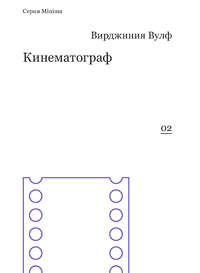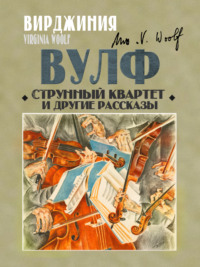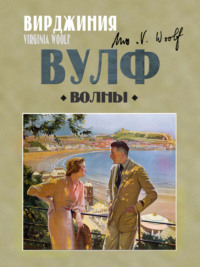 полная версия
полная версияJacob's Room
"Mr. Floyd brought it himself, did he? – I think the cheese must be in the parcel in the hall – oh, in the hall – " for she was reading. No, it was not about the boys.
"Yes, enough for fish-cakes to-morrow certainly – Perhaps Captain Barfoot – " she had come to the word "love." She went into the garden and read, leaning against the walnut tree to steady herself. Up and down went her breast. Seabrook came so vividly before her. She shook her head and was looking through her tears at the little shifting leaves against the yellow sky when three geese, half-running, half-flying, scuttled across the lawn with Johnny behind them, brandishing a stick.
Mrs. Flanders flushed with anger.
"How many times have I told you?" she cried, and seized him and snatched his stick away from him.
"But they'd escaped!" he cried, struggling to get free.
"You're a very naughty boy. If I've told you once, I've told you a thousand times. I won't have you chasing the geese!" she said, and crumpling Mr. Floyd's letter in her hand, she held Johnny fast and herded the geese back into the orchard.
"How could I think of marriage!" she said to herself bitterly, as she fastened the gate with a piece of wire. She had always disliked red hair in men, she thought, thinking of Mr. Floyd's appearance, that night when the boys had gone to bed. And pushing her work-box away, she drew the blotting-paper towards her, and read Mr. Floyd's letter again, and her breast went up and down when she came to the word "love," but not so fast this time, for she saw Johnny chasing the geese, and knew that it was impossible for her to marry any one – let alone Mr. Floyd, who was so much younger than she was, but what a nice man – and such a scholar too.
"Dear Mr. Floyd," she wrote. – "Did I forget about the cheese?" she wondered, laying down her pen. No, she had told Rebecca that the cheese was in the hall. "I am much surprised…" she wrote.
But the letter which Mr. Floyd found on the table when he got up early next morning did not begin "I am much surprised," and it was such a motherly, respectful, inconsequent, regretful letter that he kept it for many years; long after his marriage with Miss Wimbush, of Andover; long after he had left the village. For he asked for a parish in Sheffield, which was given him; and, sending for Archer, Jacob, and John to say good-bye, he told them to choose whatever they liked in his study to remember him by. Archer chose a paper-knife, because he did not like to choose anything too good; Jacob chose the works of Byron in one volume; John, who was still too young to make a proper choice, chose Mr. Floyd's kitten, which his brothers thought an absurd choice, but Mr. Floyd upheld him when he said: "It has fur like you." Then Mr. Floyd spoke about the King's Navy (to which Archer was going); and about Rugby (to which Jacob was going); and next day he received a silver salver and went – first to Sheffield, where he met Miss Wimbush, who was on a visit to her uncle, then to Hackney – then to Maresfield House, of which he became the principal, and finally, becoming editor of a well-known series of Ecclesiastical Biographies, he retired to Hampstead with his wife and daughter, and is often to be seen feeding the ducks on Leg of Mutton Pond. As for Mrs. Flanders's letter – when he looked for it the other day he could not find it, and did not like to ask his wife whether she had put it away. Meeting Jacob in Piccadilly lately, he recognized him after three seconds. But Jacob had grown such a fine young man that Mr. Floyd did not like to stop him in the street.
"Dear me," said Mrs. Flanders, when she read in the Scarborough and Harrogate Courier that the Rev. Andrew Floyd, etc., etc., had been made Principal of Maresfield House, "that must be our Mr. Floyd."
A slight gloom fell upon the table. Jacob was helping himself to jam; the postman was talking to Rebecca in the kitchen; there was a bee humming at the yellow flower which nodded at the open window. They were all alive, that is to say, while poor Mr. Floyd was becoming Principal of Maresfield House.
Mrs. Flanders got up and went over to the fender and stroked Topaz on the neck behind the ears.
"Poor Topaz," she said (for Mr. Floyd's kitten was now a very old cat, a little mangy behind the ears, and one of these days would have to be killed).
"Poor old Topaz," said Mrs. Flanders, as he stretched himself out in the sun, and she smiled, thinking how she had had him gelded, and how she did not like red hair in men. Smiling, she went into the kitchen.
Jacob drew rather a dirty pocket-handkerchief across his face. He went upstairs to his room.
The stag-beetle dies slowly (it was John who collected the beetles). Even on the second day its legs were supple. But the butterflies were dead. A whiff of rotten eggs had vanquished the pale clouded yellows which came pelting across the orchard and up Dods Hill and away on to the moor, now lost behind a furze bush, then off again helter-skelter in a broiling sun. A fritillary basked on a white stone in the Roman camp. From the valley came the sound of church bells. They were all eating roast beef in Scarborough; for it was Sunday when Jacob caught the pale clouded yellows in the clover field, eight miles from home.
Rebecca had caught the death's-head moth in the kitchen.
A strong smell of camphor came from the butterfly boxes.
Mixed with the smell of camphor was the unmistakable smell of seaweed.
Tawny ribbons hung on the door. The sun beat straight upon them.
The upper wings of the moth which Jacob held were undoubtedly marked with kidney-shaped spots of a fulvous hue. But there was no crescent upon the underwing. The tree had fallen the night he caught it. There had been a volley of pistol-shots suddenly in the depths of the wood. And his mother had taken him for a burglar when he came home late. The only one of her sons who never obeyed her, she said.
Morris called it "an extremely local insect found in damp or marshy places." But Morris is sometimes wrong. Sometimes Jacob, choosing a very fine pen, made a correction in the margin.
The tree had fallen, though it was a windless night, and the lantern, stood upon the ground, had lit up the still green leaves and the dead beech leaves. It was a dry place. A toad was there. And the red underwing had circled round the light and flashed and gone. The red underwing had never come back, though Jacob had waited. It was after twelve when he crossed the lawn and saw his mother in the bright room, playing patience, sitting up.
"How you frightened me!" she had cried. She thought something dreadful had happened. And he woke Rebecca, who had to be up so early.
There he stood pale, come out of the depths of darkness, in the hot room, blinking at the light.
No, it could not be a straw-bordered underwing.
The mowing-machine always wanted oiling. Barnet turned it under Jacob's window, and it creaked – creaked, and rattled across the lawn and creaked again.
Now it was clouding over.
Back came the sun, dazzlingly.
It fell like an eye upon the stirrups, and then suddenly and yet very gently rested upon the bed, upon the alarum clock, and upon the butterfly box stood open. The pale clouded yellows had pelted over the moor; they had zigzagged across the purple clover. The fritillaries flaunted along the hedgerows. The blues settled on little bones lying on the turf with the sun beating on them, and the painted ladies and the peacocks feasted upon bloody entrails dropped by a hawk. Miles away from home, in a hollow among teasles beneath a ruin, he had found the commas. He had seen a white admiral circling higher and higher round an oak tree, but he had never caught it. An old cottage woman living alone, high up, had told him of a purple butterfly which came every summer to her garden. The fox cubs played in the gorse in the early morning, she told him. And if you looked out at dawn you could always see two badgers. Sometimes they knocked each other over like two boys fighting, she said.
"You won't go far this afternoon, Jacob," said his mother, popping her head in at the door, "for the Captain's coming to say good-bye." It was the last day of the Easter holidays.
Wednesday was Captain Barfoot's day. He dressed himself very neatly in blue serge, took his rubber-shod stick – for he was lame and wanted two fingers on the left hand, having served his country – and set out from the house with the flagstaff precisely at four o'clock in the afternoon.
At three Mr. Dickens, the bath-chair man, had called for Mrs. Barfoot.
"Move me," she would say to Mr. Dickens, after sitting on the esplanade for fifteen minutes. And again, "That'll do, thank you, Mr. Dickens." At the first command he would seek the sun; at the second he would stay the chair there in the bright strip.
An old inhabitant himself, he had much in common with Mrs. Barfoot – James Coppard's daughter. The drinking-fountain, where West Street joins Broad Street, is the gift of James Coppard, who was mayor at the time of Queen Victoria's jubilee, and Coppard is painted upon municipal watering-carts and over shop windows, and upon the zinc blinds of solicitors' consulting-room windows. But Ellen Barfoot never visited the Aquarium (though she had known Captain Boase who had caught the shark quite well), and when the men came by with the posters she eyed them superciliously, for she knew that she would never see the Pierrots, or the brothers Zeno, or Daisy Budd and her troupe of performing seals. For Ellen Barfoot in her bath-chair on the esplanade was a prisoner – civilization's prisoner – all the bars of her cage falling across the esplanade on sunny days when the town hall, the drapery stores, the swimming-bath, and the memorial hall striped the ground with shadow.
An old inhabitant himself, Mr. Dickens would stand a little behind her, smoking his pipe. She would ask him questions – who people were – who now kept Mr. Jones's shop – then about the season – and had Mrs. Dickens tried, whatever it might be – the words issuing from her lips like crumbs of dry biscuit.
She closed her eyes. Mr. Dickens took a turn. The feelings of a man had not altogether deserted him, though as you saw him coming towards you, you noticed how one knobbed black boot swung tremulously in front of the other; how there was a shadow between his waistcoat and his trousers; how he leant forward unsteadily, like an old horse who finds himself suddenly out of the shafts drawing no cart. But as Mr. Dickens sucked in the smoke and puffed it out again, the feelings of a man were perceptible in his eyes. He was thinking how Captain Barfoot was now on his way to Mount Pleasant; Captain Barfoot, his master. For at home in the little sitting-room above the mews, with the canary in the window, and the girls at the sewing-machine, and Mrs. Dickens huddled up with the rheumatics – at home where he was made little of, the thought of being in the employ of Captain Barfoot supported him. He liked to think that while he chatted with Mrs. Barfoot on the front, he helped the Captain on his way to Mrs. Flanders. He, a man, was in charge of Mrs. Barfoot, a woman.
Turning, he saw that she was chatting with Mrs. Rogers. Turning again, he saw that Mrs. Rogers had moved on. So he came back to the bath-chair, and Mrs. Barfoot asked him the time, and he took out his great silver watch and told her the time very obligingly, as if he knew a great deal more about the time and everything than she did. But Mrs. Barfoot knew that Captain Barfoot was on his way to Mrs. Flanders.
Indeed he was well on his way there, having left the tram, and seeing Dods Hill to the south-east, green against a blue sky that was suffused with dust colour on the horizon. He was marching up the hill. In spite of his lameness there was something military in his approach. Mrs. Jarvis, as she came out of the Rectory gate, saw him coming, and her Newfoundland dog, Nero, slowly swept his tail from side to side.
"Oh, Captain Barfoot!" Mrs. Jarvis exclaimed.
"Good-day, Mrs. Jarvis," said the Captain.
They walked on together, and when they reached Mrs. Flanders's gate Captain Barfoot took off his tweed cap, and said, bowing very courteously:
"Good-day to you, Mrs. Jarvis."
And Mrs. Jarvis walked on alone.
She was going to walk on the moor. Had she again been pacing her lawn late at night? Had she again tapped on the study window and cried: "Look at the moon, look at the moon, Herbert!"
And Herbert looked at the moon.
Mrs. Jarvis walked on the moor when she was unhappy, going as far as a certain saucer-shaped hollow, though she always meant to go to a more distant ridge; and there she sat down, and took out the little book hidden beneath her cloak and read a few lines of poetry, and looked about her. She was not very unhappy, and, seeing that she was forty-five, never perhaps would be very unhappy, desperately unhappy that is, and leave her husband, and ruin a good man's career, as she sometimes threatened.
Still there is no need to say what risks a clergyman's wife runs when she walks on the moor. Short, dark, with kindling eyes, a pheasant's feather in her hat, Mrs. Jarvis was just the sort of woman to lose her faith upon the moors – to confound her God with the universal that is – but she did not lose her faith, did not leave her husband, never read her poem through, and went on walking the moors, looking at the moon behind the elm trees, and feeling as she sat on the grass high above Scarborough… Yes, yes, when the lark soars; when the sheep, moving a step or two onwards, crop the turf, and at the same time set their bells tinkling; when the breeze first blows, then dies down, leaving the cheek kissed; when the ships on the sea below seem to cross each other and pass on as if drawn by an invisible hand; when there are distant concussions in the air and phantom horsemen galloping, ceasing; when the horizon swims blue, green, emotional – then Mrs. Jarvis, heaving a sigh, thinks to herself, "If only some one could give me… if I could give some one…" But she does not know what she wants to give, nor who could give it her.
"Mrs. Flanders stepped out only five minutes ago, Captain," said Rebecca. Captain Barfoot sat him down in the arm-chair to wait. Resting his elbows on the arms, putting one hand over the other, sticking his lame leg straight out, and placing the stick with the rubber ferrule beside it, he sat perfectly still. There was something rigid about him. Did he think? Probably the same thoughts again and again. But were they "nice" thoughts, interesting thoughts? He was a man with a temper; tenacious, faithful. Women would have felt, "Here is law. Here is order. Therefore we must cherish this man. He is on the Bridge at night," and, handing him his cup, or whatever it might be, would run on to visions of shipwreck and disaster, in which all the passengers come tumbling from their cabins, and there is the captain, buttoned in his pea-jacket, matched with the storm, vanquished by it but by none other. "Yet I have a soul," Mrs. Jarvis would bethink her, as Captain Barfoot suddenly blew his nose in a great red bandanna handkerchief, "and it's the man's stupidity that's the cause of this, and the storm's my storm as well as his"… so Mrs. Jarvis would bethink her when the Captain dropped in to see them and found Herbert out, and spent two or three hours, almost silent, sitting in the arm-chair. But Betty Flanders thought nothing of the kind.
"Oh, Captain," said Mrs. Flanders, bursting into the drawing-room, "I had to run after Barker's man… I hope Rebecca… I hope Jacob…"
She was very much out of breath, yet not at all upset, and as she put down the hearth-brush which she had bought of the oil-man, she said it was hot, flung the window further open, straightened a cover, picked up a book, as if she were very confident, very fond of the Captain, and a great many years younger than he was. Indeed, in her blue apron she did not look more than thirty-five. He was well over fifty.
She moved her hands about the table; the Captain moved his head from side to side, and made little sounds, as Betty went on chattering, completely at his ease – after twenty years.
"Well," he said at length, "I've heard from Mr. Polegate."
He had heard from Mr. Polegate that he could advise nothing better than to send a boy to one of the universities.
"Mr. Floyd was at Cambridge… no, at Oxford… well, at one or the other," said Mrs. Flanders.
She looked out of the window. Little windows, and the lilac and green of the garden were reflected in her eyes.
"Archer is doing very well," she said. "I have a very nice report from Captain Maxwell."
"I will leave you the letter to show Jacob," said the Captain, putting it clumsily back in its envelope.
"Jacob is after his butterflies as usual," said Mrs. Flanders irritably, but was surprised by a sudden afterthought, "Cricket begins this week, of course."
"Edward Jenkinson has handed in his resignation," said Captain Barfoot.
"Then you will stand for the Council?" Mrs. Flanders exclaimed, looking the Captain full in the face.
"Well, about that," Captain Barfoot began, settling himself rather deeper in his chair.
Jacob Flanders, therefore, went up to Cambridge in October, 1906.
CHAPTER THREE
"This is not a smoking-carriage," Mrs. Norman protested, nervously but very feebly, as the door swung open and a powerfully built young man jumped in. He seemed not to hear her. The train did not stop before it reached Cambridge, and here she was shut up alone, in a railway carriage, with a young man.
She touched the spring of her dressing-case, and ascertained that the scent-bottle and a novel from Mudie's were both handy (the young man was standing up with his back to her, putting his bag in the rack). She would throw the scent-bottle with her right hand, she decided, and tug the communication cord with her left. She was fifty years of age, and had a son at college. Nevertheless, it is a fact that men are dangerous. She read half a column of her newspaper; then stealthily looked over the edge to decide the question of safety by the infallible test of appearance… She would like to offer him her paper. But do young men read the Morning Post? She looked to see what he was reading – the Daily Telegraph.
Taking note of socks (loose), of tie (shabby), she once more reached his face. She dwelt upon his mouth. The lips were shut. The eyes bent down, since he was reading. All was firm, yet youthful, indifferent, unconscious – as for knocking one down! No, no, no! She looked out of the window, smiling slightly now, and then came back again, for he didn't notice her. Grave, unconscious… now he looked up, past her… he seemed so out of place, somehow, alone with an elderly lady… then he fixed his eyes – which were blue – on the landscape. He had not realized her presence, she thought. Yet it was none of HER fault that this was not a smoking-carriage – if that was what he meant.
Nobody sees any one as he is, let alone an elderly lady sitting opposite a strange young man in a railway carriage. They see a whole – they see all sorts of things – they see themselves… Mrs. Norman now read three pages of one of Mr. Norris's novels. Should she say to the young man (and after all he was just the same age as her own boy): "If you want to smoke, don't mind me"? No: he seemed absolutely indifferent to her presence… she did not wish to interrupt.
But since, even at her age, she noted his indifference, presumably he was in some way or other – to her at least – nice, handsome, interesting, distinguished, well built, like her own boy? One must do the best one can with her report. Anyhow, this was Jacob Flanders, aged nineteen. It is no use trying to sum people up. One must follow hints, not exactly what is said, nor yet entirely what is done – for instance, when the train drew into the station, Mr. Flanders burst open the door, and put the lady's dressing-case out for her, saying, or rather mumbling: "Let me" very shyly; indeed he was rather clumsy about it.
"Who…" said the lady, meeting her son; but as there was a great crowd on the platform and Jacob had already gone, she did not finish her sentence. As this was Cambridge, as she was staying there for the week-end, as she saw nothing but young men all day long, in streets and round tables, this sight of her fellow-traveller was completely lost in her mind, as the crooked pin dropped by a child into the wishing-well twirls in the water and disappears for ever.
They say the sky is the same everywhere. Travellers, the shipwrecked, exiles, and the dying draw comfort from the thought, and no doubt if you are of a mystical tendency, consolation, and even explanation, shower down from the unbroken surface. But above Cambridge – anyhow above the roof of King's College Chapel – there is a difference. Out at sea a great city will cast a brightness into the night. Is it fanciful to suppose the sky, washed into the crevices of King's College Chapel, lighter, thinner, more sparkling than the sky elsewhere? Does Cambridge burn not only into the night, but into the day?
Look, as they pass into service, how airily the gowns blow out, as though nothing dense and corporeal were within. What sculptured faces, what certainty, authority controlled by piety, although great boots march under the gowns. In what orderly procession they advance. Thick wax candles stand upright; young men rise in white gowns; while the subservient eagle bears up for inspection the great white book.
An inclined plane of light comes accurately through each window, purple and yellow even in its most diffused dust, while, where it breaks upon stone, that stone is softly chalked red, yellow, and purple. Neither snow nor greenery, winter nor summer, has power over the old stained glass. As the sides of a lantern protect the flame so that it burns steady even in the wildest night – burns steady and gravely illumines the tree-trunks – so inside the Chapel all was orderly. Gravely sounded the voices; wisely the organ replied, as if buttressing human faith with the assent of the elements. The white-robed figures crossed from side to side; now mounted steps, now descended, all very orderly.
… If you stand a lantern under a tree every insect in the forest creeps up to it – a curious assembly, since though they scramble and swing and knock their heads against the glass, they seem to have no purpose – something senseless inspires them. One gets tired of watching them, as they amble round the lantern and blindly tap as if for admittance, one large toad being the most besotted of any and shouldering his way through the rest. Ah, but what's that? A terrifying volley of pistol-shots rings out – cracks sharply; ripples spread – silence laps smooth over sound. A tree – a tree has fallen, a sort of death in the forest. After that, the wind in the trees sounds melancholy.
But this service in King's College Chapel – why allow women to take part in it? Surely, if the mind wanders (and Jacob looked extraordinarily vacant, his head thrown back, his hymn-book open at the wrong place), if the mind wanders it is because several hat shops and cupboards upon cupboards of coloured dresses are displayed upon rush-bottomed chairs. Though heads and bodies may be devout enough, one has a sense of individuals – some like blue, others brown; some feathers, others pansies and forget-me-nots. No one would think of bringing a dog into church. For though a dog is all very well on a gravel path, and shows no disrespect to flowers, the way he wanders down an aisle, looking, lifting a paw, and approaching a pillar with a purpose that makes the blood run cold with horror (should you be one of a congregation – alone, shyness is out of the question), a dog destroys the service completely. So do these women – though separately devout, distinguished, and vouched for by the theology, mathematics, Latin, and Greek of their husbands. Heaven knows why it is. For one thing, thought Jacob, they're as ugly as sin.
Now there was a scraping and murmuring. He caught Timmy Durrant's eye; looked very sternly at him; and then, very solemnly, winked.
"Waverley," the villa on the road to Girton was called, not that Mr. Plumer admired Scott or would have chosen any name at all, but names are useful when you have to entertain undergraduates, and as they sat waiting for the fourth undergraduate, on Sunday at lunch-time, there was talk of names upon gates.
"How tiresome," Mrs. Plumer interrupted impulsively. "Does anybody know Mr. Flanders?"









